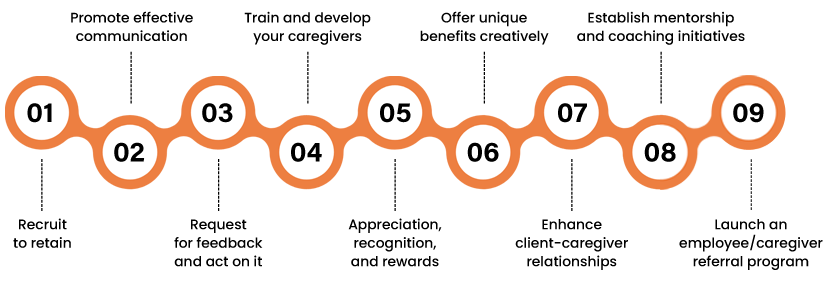
Senior care has long grappled with retaining qualified caregivers, especially in the home care sector, where turnover rates have soared to over 80%. This turnover trend is primarily driven by caregivers seeking better opportunities elsewhere, feeling disconnected from their teams, lacking growth prospects within their organizations, and facing barriers to accessing ongoing education.
The COVID-19 pandemic has intensified this issue, with home care caregivers bearing the brunt of the crisis. They’ve worked tirelessly under challenging conditions, adapting to constantly changing guidelines and protocols, leading to feelings of exhaustion, underappreciation, and stress.
Home care agencies must address caregiver retention despite pandemic-related and day-to-day operational pressures to ensure consistent patient care. Understanding the reasons for caregiver turnover is the first step toward developing effective retention strategies. Agencies need to provide support and opportunities for growth, acknowledge the invaluable contributions of caregivers, and alleviate the challenges they face during and beyond the pandemic.
This is why today we will share the top 9 tips for creating an effective caregiver retention strategy.
Caregiver retention is important for home care agencies to provide quality care and keep patients happy. Keeping caregivers for a long time helps in many ways:

Home care agencies must prioritize efforts to retain caregivers to ensure the sustainability and success of their operations.
Understanding the reasons behind high caregiver turnover is crucial for home care agencies to address this challenge effectively. A recent survey uncovered the top complaints expressed by caregivers when exiting an agency:
In the present job market, caregivers have numerous opportunities, so home care agencies must reevaluate their retention strategies. Creating new strategies based on these concerns may be necessary for some individuals.
Improving caregiver turnover rates requires more than just offering higher salaries, which may only be achievable for some home care agencies. The profitable news for caregiving agencies is that salary isn’t the sole factor influencing caregiver retention. Instead, paying closer attention to caregivers’ needs and implementing effective retention strategies is crucial.
Here, we’ve compiled nine tips to help you develop a retention strategy to retain competent caregivers and stay competitive. The effectiveness of these tips will depend on various aspects distinct to your agency, such as size, market, location, objectives, team strengths, and available resources. Consider your agency’s landscape before implementing these strategies.

Ensuring caregiver retention begins with a thoughtful recruitment strategy. Crafting job postings that detail the role and convey the essence of your agency’s values and culture is essential. These postings serve as the initial point of contact with potential employees and provide a chance to make a lasting impression. By addressing the current landscape and highlighting what makes your agency unique, you can attract candidates who align with your vision and mission.
Developing effective hiring processes is vital for establishing a strong team of caregivers. By optimizing these processes, you can attract, engage, and ultimately retain top talent. It’s important to streamline the application and interview process, making it straightforward and accessible for candidates. Additionally, emphasizing the significance of the onboarding period cannot be overstated. Providing an optimistic experience during the first 90 days of employment sets the tone for the caregiver’s tenure and significantly impacts retention rates. Therefore, a seamless onboarding process fosters long-term commitment and satisfaction among caregivers.
Building effective communication is crucial for caregiver retention. The primary concern often raised by caregivers is the “lack of communication” from their agency. To address this issue, it’s essential to prioritize effective communication as a cornerstone of any retention method.
Caregivers can experience burnout and resign without reaching out or seeking assistance. By fostering an open, honest work environment with transparent communication channels, employees are more likely to experience higher job satisfaction. This environment encourages caregivers to address problems early on before they consider leaving.
Consistently soliciting feedback from your caregiver team and genuinely valuing their input is crucial for fostering a robust two-way communication approach tailored to individual needs and collective goals.
Failure to promptly address feedback or concerns within your agency can convey a message to caregivers that their contributions are not truly appreciated, potentially leading them to seek alternative career opportunities. Creating a culture where feedback is actively sought and promptly acted upon can significantly improve caregiver retention by:
To encourage open feedback, provide options for anonymous submissions, such as suggestion boxes. Every caregiver needs to know that their voice matters.
Consider establishing a quality enhancement team to proactively address feedback issues before escalating. Additionally, collecting feedback allows you to identify what caregivers value and what motivates them, aiding in decisions about benefits and rewards.
Overall, prioritizing feedback and promptly addressing it helps strengthen your agency’s relationship with caregivers and enhances retention rates.
Investing in training is a valuable commitment to nurturing the primary asset of any agency: its caregivers. Such investment plays a pivotal role in retaining employees.
When caregivers seek further learning opportunities, agencies must demonstrate support and assistance. Recent research underscores this point, revealing that nearly 90% of employees are willing to remain with their current agency if it invests in their professional development.
By prioritizing ongoing, high-quality training and education initiatives, agencies reaffirm the significance of caregivers within the team and showcase a genuine concern for their advancement. The goal is to cultivate an environment where caregivers:
Notably, such initiatives enhance caregiver satisfaction and contribute significantly to client/patient satisfaction levels.
As part of a comprehensive retention strategy, agencies can explore the creation of ‘advanced caregiver roles’ reserved for employees who have completed specialized training in areas such as Alzheimer’s or Hospice care. These specialized roles recognize caregivers’ expertise and provide avenues for further professional growth and development.
To retain your talented caregiver team, it’s crucial to appreciate, recognize, and reward their hard work, particularly during challenging times. Approximately 65% of employees indicate they would seek another job if they feel unappreciated, highlighting the importance of acknowledging caregivers regularly.
In addition to providing verbal or written recognition to remind caregivers of their value, consider implementing a monthly caregiver appreciation program to reward top performers. Allowing your agency to offer rewards for meeting performance criteria such as punctuality and willingness to pick up extra shifts.
Ensure that the rewards offered are meaningful to caregivers, which can significantly impact retention rates. Getting it right can be transformative for your agency.
Research indicates that caregivers are more inclined to stay with an agency that provides an appealing benefits package. Crafting such a package doesn’t have to be costly if you tailor it to what motivates your caregivers. Each caregiver will have different needs and preferences, so listening and responding is essential.
Consider implementing benefits such as-
Improving relationships between caregivers and clients/patients is crucial for caregiver retention. Ongoing conflicts or negative interactions can lead to job dissatisfaction and prompt caregivers to seek opportunities elsewhere. Prioritize your caregivers’ well-being by minimizing stressors and addressing client-related issues promptly.
Some agencies have opted to terminate relationships with clients who mistreat their staff to demonstrate their commitment to their caregivers’ welfare. You reinforce their value and loyalty to your agency by prioritizing your team’s care.
In addition to selecting suitable caregivers, focus on matching them with compatible clients for optimal satisfaction. By mastering this matchmaking process, you can attract caregivers and clients who appreciate the emphasis on compatibility and long-term relationships over immediate availability.
With a thoughtful retention strategy, you can create a positive environment that fosters lasting relationships between caregivers and clients, ultimately enhancing retention rates for both parties.
Effective mentorship and coaching programs can boost caregiver retention rates while enhancing the quality of care provided to clients/patients.
Assigning mentors to new hires helps them become confident in their caregiving skills and fosters camaraderie among caregivers, ensuring they start on the right foot at your agency. Additionally, mentorship opportunities offer career advancement for experienced caregivers, creating a promotion path and increasing job satisfaction.
Success coaches support new joiners during onboarding, addressing obstacles such as childcare, financial concerns, transportation, and advanced caregiver training needs.
Agencies implementing this approach have reported a 97% retention rate among caregivers who engage with their success coach, making it a worthwhile investment.
Employee referrals are associated with a 25% lower turnover rate than other recruitment sources.
Capitalize on this trend by implementing a caregiver referral program.
Even though there are initial setup costs, they are significantly lower than the expenses incurred in replacing a caregiver. A modest $100-200 bonus incentivizes quality referrals and contributes to long-term retention.
Regular communication about the referral program through various channels such as SMS, newsletters, and online meetings helps keep it in mind for current caregivers. Timely payout of bonuses and tracking referral sources allow you to assess the program’s effectiveness and adjust as needed.
Despite the challenges faced by home care agencies, caregiver turnover remains a constant issue. By implementing effective retention strategies, such as mentorship programs and referral initiatives, agencies can overcome this challenge and achieve sustained growth. Investing in retention efforts may incur costs, but the consequences of neglecting retention are far more substantial over time.
Caregiving is rewarding but taxing, frequently resulting in stress, burnout, and emotional exhaustion. Companies that invest in mental health care retain caregivers better and provide quality care to clients.
Our advanced caregiver training solution is tailored to meet the specific requirements mandated by state regulations. Caregivers receive comprehensive and relevant content that directly applies to their role, ensuring they have the knowledge needed to provide quality care.
Caregivers lead busy lives, often juggling multiple responsibilities. With Learn2Care, they can access training materials anytime, anywhere, and on any device. This flexibility enables them to learn at their own pace, whether they are at home, commuting, or on a break between caregiving duties.
Our caregiver training courses modules are designed to be engaging and easily digestible, allowing caregivers to quickly absorb key information and confidently get back to work. By providing bite-sized content, caregivers can stay up-to-date without sacrificing valuable time away from their clients.
Continuous learning is essential for caregivers to stay informed about best practices and industry standards. Learn2Care helps caregivers upskill and expand their knowledge base, ensuring they provide their clients with the highest quality of care.
Caregivers have varying learning styles and preferences. With Learn2Care, they can have the flexibility to learn at their desired pace. Our platform allows them to pause, resume, and review content as needed, leading to a more effective and personalized learning experience.
Through our program, caregivers can become certified, demonstrating their dedication to professional development and quality care. Certification not only validates their skills but also opens up additional opportunities for career advancement.
Caregiver retention is a critical factor in the success and sustainability of home care agencies. By implementing strategies to address caregiver concerns and enhance their experience, agencies can mitigate turnover and promote a positive work environment. Effective communication, caregiver training and development programs, unique benefits, mentorship and coaching initiatives, and employee referral programs are valuable tools.
By prioritizing caregiver well-being and investing in their professional growth, agencies improve retention rates and enhance the quality of care provided to clients/patients. Furthermore, these initiatives contribute to a culture of appreciation and recognition, where caregivers feel valued and supported.
While retention efforts may require initial investment, the long-term benefits far outweigh the costs. Agencies prioritizing caregiver retention are better positioned to achieve sustained growth and success in the home care industry. By continually refining and adapting retention strategies, agencies can overcome the challenges of caregiver turnover and build a thriving workforce dedicated to providing exceptional care.
Contact us to inquire about our state-wise training courses and take the first step towards upskilling your team with a 14-day free trial!